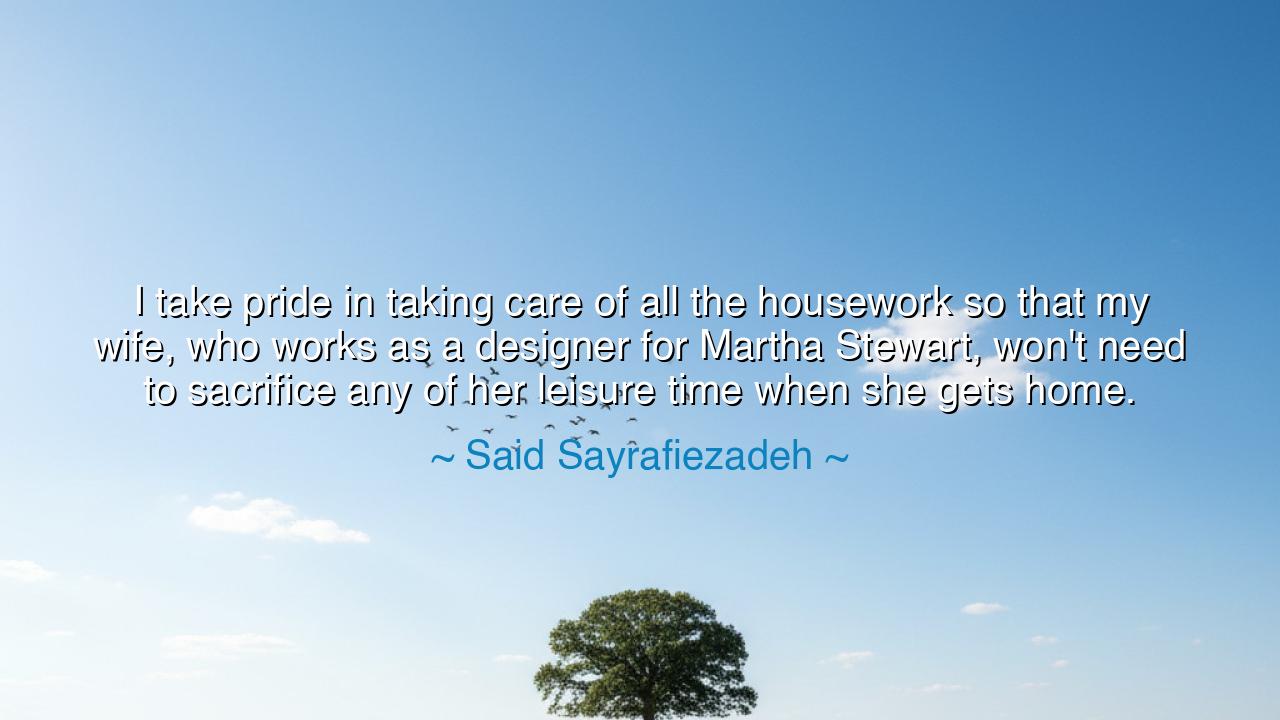
I take pride in taking care of all the housework so that my wife
I take pride in taking care of all the housework so that my wife, who works as a designer for Martha Stewart, won't need to sacrifice any of her leisure time when she gets home.






In the ledger of love, a quiet vow is written not in ink but in dishes washed and floors swept: “I take pride in taking care of all the housework so that my wife, who works as a designer for Martha Stewart, won’t need to sacrifice any of her leisure time when she gets home.” So speaks Said Sayrafiezadeh, and the sentence glows like a hearth on a winter evening. It names a reordering of honor: that greatness may be measured not by conquest abroad but by constancy at home; that the truest crown is the one you wear when no one is looking—the apron that frees another to rest.
Hear the wisdom braided through each word. To take pride in housework is to overturn the old, rusted hierarchy that called such labor invisible. The broom becomes a scepter, the laundry a liturgy, the sink a small sanctuary. In this vision, partnership is not a ledger of favors but a covenant of care: you come home from the market of the world, and I will have already opened the door of peace. Your leisure time—that hidden gold of renewal—shall not be taxed by crumbs, clutter, or the endless list that steals twilight from the weary.
This vow also knits itself to history’s wider tapestry. For generations, many homes were built on the uncounted work of women—the famous second shift—where a full day’s wage work was followed by a full night’s unpaid labor. To pledge, as Said does, to shoulder the housework is not merely gallant; it is just. It is a small rebellion against the custom that praises achievement while quietly assuming who will scrub the pan. In elevating the designer’s craft and guarding her leisure time, he aligns the private economy of a household with the public dignity she has won beyond it.
Let a story walk beside these words. A friend once told me of Amara, a surgeon whose hands steadied strangers at dawn and dusk. Her husband, Malik, kept another theater: the kitchen. He had learned her rotations like a sailor learns the tide. On call nights he made soups that traveled well; on recovery days he hung laundry in the bright yards of afternoon and filled the house with mint. He did not wait to be asked; he delighted to anticipate. Years later, when Malik began a demanding study course, Amara reversed the current without complaint. Their marriage moved like a pair of lungs: one side drawing breath while the other gave, each knowing its turn would come, and both praising the work of the other.
History carries a grander echo. On October 24, 1975, the women of Iceland stepped away from both formal employment and unpaid domestic labor for a single day—workplaces faltered, schools scrambled, and the nation saw the pillars it had overlooked. From that demonstration flowed reforms and a clearer sight: when housework is treated as trivial, society sickens; when it is honored and shared, the commonwealth grows strong. Said’s sentence belongs to this tradition; it is a household-scale revolution, a banner hung not in the square but beside the sink.
Take the lesson plainly: love is logistics. To cherish someone is to protect their leisure time with the same zeal you protect their good name; to count the hours of rest you return to them as carefully as the hours of toil you give. Do not romanticize exhaustion. Rest is the well where music returns, where patience is brewed, where vision is sharpened for tomorrow’s craft—whether in a studio that bears Martha Stewart’s seal or in any workshop of the world.
Carry these practices as provisions for your own road. (1) Make a domestic charter: list the recurring tasks and assign ownership, not vague “help”—calendars, bills, repairs, meals. (2) Institute sacred leisure blocks for each partner—hours that are inviolable and defended by the other. (3) Build systems—a nightly reset, a weekly deep clean, a shared grocery list—so care does not depend on memory alone. (4) Practice anticipatory kindness: refill what empties, mend what frays, prep what tomorrow’s hero will need. (5) Finally, praise aloud the seen and unseen: the gleam of a counter, the folded shirt, the unclogged drain. Gratitude is the oil that keeps the gears from grinding.
Thus the teaching passes down: in a world dazzled by spectacle, let us be known by the peace our beloveds find when they cross our threshold. Let pride dwell in the humble place, and let housework become a hymn. Then the designer’s hand returns to her art steady and unburdened, the home hums like a well-tuned instrument, and the days gather into a life where each has found rest in the other’s care.






AAdministratorAdministrator
Welcome, honored guests. Please leave a comment, we will respond soon